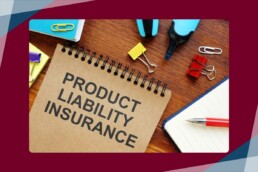What Product Liability Insurance Can Do for Your Business
In 2020, the average product liability claim paid a whopping $7,058,106, with a median claim payout of $3,908,111.
In today’s world, there’s an influx of product liability cases, many of which require a settlement from the product’s company.
The risk of this happening to your small business can be avoided by ensuring you have the right amount of product liability insurance.
Read on to learn more about product liability insurance, what it means, and how it can protect your business.
What Is Product Liability Insurance?
Product liability insurance is a type of insurance coverage that protects businesses if a product they make or sell has something going wrong.
If something goes wrong with the product, the product buyer, user, or even a bystander can make a claim against the maker or company who sold it to them.
The person impacted could file a claim if the product causes bodily injury or property damage.
You can seek product liability insurance from your business insurance agency. Some offer stand-alone policies, while others can do an add-on policy as part of their general liability insurance.
What’s Covered Under Product Liability Insurance?
A business can seek product liability coverage for products they:
- Made
- Sold
- Distributed
This is especially true if the product could cause personal injury, property damage, or other loss, as it puts them at risk of a lawsuit.
Since there are so many products you might seek coverage for, let’s look at examples of coverage provided.
A product might cause bodily injury that results in a claim against a company. The product liability coverage would cover the costs for:
- Hiring an attorney
- Resulting settlement
- Court-ordered judgment
It’s possible a product could cause damage to a person’s property. The insurance covers the resulting claims if the product has a defect or the instruction manual is defective. This can include instances where a beauty salon has a product that causes a severe allergy in clients or where a restaurant serves spoiled food that makes customers very sick.
Another protection from product liability insurance is from illness caused by a product.
The worst-case scenario is a product that causes death. Then, product liability insurance would cover lawsuits, burial costs, and other expenses related to death.
Who Needs Product Liability Insurance?
Business owners or managers who sell products to customers or are part of a supply chain should consider product liability insurance.
You could specifically benefit from this insurance type if you’re a:
- Manufacturer
- Retailer
- Wholesale & distribution business
You would likely benefit from the protections offered by product liability coverage. Any issue that arises with a product from any stage of its manufacturing can make a business liable.
Why Is Product Liability Insurance Important?
A product liability claim for an uninsured small business can be catastrophic for the business. Your business is liable if manufacturing defects cause injury, illness, death, or property damage.
If you don’t have product liability coverage, you could be paying for medical costs, settlements costs, and legal representation out of pocket.
Understanding Product Liability Insurance
Product liability insurance is something any business that makes or is part of a supply chain should consider to protect themselves.
If you’d like more information about product liability coverage or want to know if your business would benefit from it, we can help. Contact us today to learn more about our general business liability coverage and special coverage like product liability.
Related Articles
Why Do I Need Manufacturers Insurance For My Business?
In 2016, Samsung had to recall around 2.5 million brand-new phones because they were randomly combusting. The company tried to correct this issue by changing…
All About the Different Types of Business Insurance
In 2018 alone, US businesses paid about $343 billion in lawsuits, $182 billion of which was shouldered by small businesses. The US tort system costs have gone…


